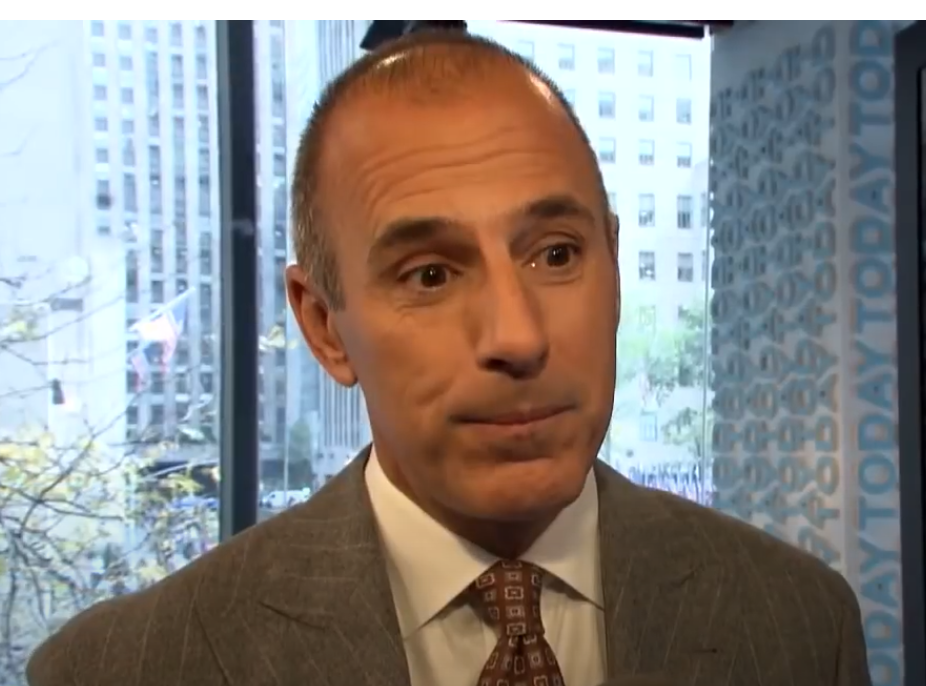Although Matt Lauer’s demise happened with startling speed, its effects are still felt throughout broadcast media. Millions of viewers once viewed him as a polished and endearing host on NBC’s Today, representing routine and trust. However, accusations surfaced behind the scenes that profoundly changed his legacy. His nearly forty-year career came to an abrupt end on November 29, 2017, when NBC terminated his contract following a thorough sexual misconduct allegation from a coworker.

With the disclosures made public in Ronan Farrow’s investigative novel Catch and Kill, these accusations have transformed from murky rumors to a startlingly explicit story in recent years. Brooke Nevils, a former NBC producer, claims that the event that led to her official complaint happened during the 2014 Winter Olympics in Sochi, Russia. She said that she was “too drunk to consent” and that she repeatedly stated that she did not want to have anal sex when Lauer raped her in his hotel room.
Matt Lauer – Personal & Career Profile
| Category | Details |
|---|---|
| Full Name | Matthew Todd Lauer |
| Date of Birth | December 30, 1957 (Age 67) |
| Place of Birth | New York City, United States |
| Education | Ohio University |
| Career Span | 1979 – 2017 |
| Notable Roles | Co-anchor of Today (1997–2017), News anchor (1994–1997) |
| Network | NBC News |
| Major Programs | Today, Dateline NBC, Macy’s Thanksgiving Parade |
| Marriages | Nancy Alspaugh (1982–1989), Annette Roque (1998–2019) |
| Children | Three |
| Termination | Fired from NBC on November 29, 2017 |
| Reference | Wikipedia – Matt Lauer |
Nevils described her interaction in great detail, portraying it as a darkly transactional affair rather than a partnership. Her remarks reflected a remarkably similar dynamic observed in earlier media crises where consent was ambiguous due to power disparities. She went on to say that several sexual encounters ensued in New York, motivated by fear, manipulation, and professional pressure rather than pleasure.
Lauer responded with a lengthy statement, describing the encounter as adulterous but consensual. He asserted that what he called “the first of many” reciprocal engagements began with the encounter in Sochi. Despite these claims, Lauer’s explanation was noticeably at odds with Nevils’ story. In contrast to her story, which was dominated by sorrow, trauma, and bewilderment, his story was one of eager agreement. His defense, which was based on personal interpretation and denials, did not appeal to many of his former colleagues or the general public.
NBC’s response was quick and clearly shocked. On the day of his termination, Hoda Kotb and Savannah Guthrie made an appearance on television, looking stunned and upset. Guthrie’s statement, “We are disturbed to our core,” reflected a sentiment that permeated American homes. Many people felt that the accusations were a betrayal from someone they had accepted into their daily routine for years.
Lauer’s longtime co-host Katie Couric likewise gave a noticeably uncomfortable response. She described the actions as “callous” and “grossly inappropriate,” a dichotomy she had never seen firsthand. She remarked, “That’s not the Matt I knew,” highlighting a troublingly prevalent trait of public personalities: the capacity to appear honorable while hiding more sinister tendencies.
Reports that suggested NBC may have previously been aware of such activity further complicated the situation. Through nondisclosure agreements, the network allegedly struck covert settlements with additional women who had complained about Lauer over the years, essentially silencing them, according to Farrow’s book. The optics were bad, even if NBC denied any prior knowledge prior to 2017. Both staff and spectators found resonance in the idea that warning indications might have been concealed or disregarded.
It becomes more clear how the media and entertainment industries have traditionally protected powerful men from criticism when this case is linked to others like Charlie Rose, Les Moonves, and Harvey Weinstein. Due to his position, Lauer was able to function in insulated hallways where cautions were disregarded and grievances were reduced to murmurs.
Nevils faced considerable scrutiny as a result of being in the public eye. She was attacked personally in addition to being questioned about her reliability, which reflected the way society frequently expects women to demonstrate pain in a completely consistent manner. Nevertheless, her courage to speak up sparked discussions that television newsrooms had long been lacking. Farrow used supported reporting and clever narrative to amplify her voice in a way that was especially novel for investigative journalism at the time.
Lauer has not been charged with any crimes, but his story has been drastically altered by the court of public opinion. After selling a number of properties and removing himself from public life, he is said to live in relative seclusion. According to people close to him, he feels he was “railroaded” and only talks to people who agree with his version of events.
This attitude, which is particularly protective and unreflective, exposes a persistent opposition to accountability in situations involving well-known males. It’s not only about the accusations; it’s also about the refusal to change, listen, or admit wrongdoing. Although the business has since progressed, NBC’s history is still marked by the scandal’s scar.
A change in society expectations is highlighted by the lawsuit and the larger issue. Younger audiences in particular are less likely to distinguish between personal behavior and talent. Being ethical is now a requirement, not an extra. In order to combat harassment and create processes that are noticeably more responsive, newsrooms are undergoing extensive structural modifications. Many media companies today seek to create safer, more inclusive workplaces by utilizing external audits, employee education, and private reporting channels.
